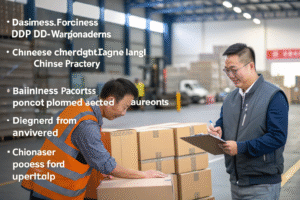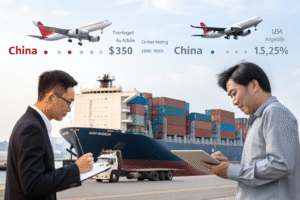Shipping goods internationally from China requires more than just packaging and booking a carrier. Without the correct documentation, shipments can be delayed, fined, or even rejected at customs. Many first-time importers underestimate how much paperwork is involved. As a freight forwarder, I know that preparing accurate and complete documents is the foundation of smooth logistics.
Yes, there are specific documents you need for international shipping from China. The most essential ones are the Bill of Lading, Commercial Invoice, Packing List, Certificate of Origin, and in some cases specialized compliance documents depending on the type of goods.
By understanding these requirements in advance, importers can avoid unnecessary costs, delays, and complications.
Why Is the Bill of Lading So Important?
The Bill of Lading (B/L) is the most crucial document in international shipping. It serves three main functions: it’s a receipt for cargo, a contract of carriage, and a document of title that proves ownership of goods.
Without a proper Bill of Lading, goods cannot be released at the destination port, making it the backbone of international shipping.

What types of Bills of Lading are used?
There are two common types: Master Bill of Lading (MBL) issued by shipping lines, and House Bill of Lading (HBL) issued by freight forwarders. Maersk explains their functions in detail. Freightos also provides guidance on when to use each type.
Why does accuracy matter on the B/L?
Even small errors in consignee details or HS Codes can delay clearance. According to FIATA, incorrect documents are one of the most common causes of shipment delays. Trade Finance Global stresses the importance of double-checking data before submission.
What Role Do the Commercial Invoice and Packing List Play?
The Commercial Invoice and Packing List are vital for customs clearance. Customs officers use them to verify product details, values, and quantities.
These documents ensure that customs authorities can assess duties and taxes accurately, while also preventing shipment disputes between buyers and sellers.

Why is the Commercial Invoice necessary?
The Commercial Invoice states the buyer, seller, product description, unit price, total value, and payment terms. U.S. Customs and Border Protection requires this document for imports. Export.gov also lists it as mandatory for international trade. This invoice often specifies the Incoterms agreed between buyer and seller, which define cost and risk allocation.
How does the Packing List support the invoice?
The Packing List provides details like the number of cartons, dimensions, and weight of each package. This helps freight forwarders calculate charges and helps customs confirm shipment accuracy. International Trade Centre recommends attaching Packing Lists outside cartons for faster inspections. ICC explains that Packing Lists are critical for Incoterms compliance.
Why Do You Need a Certificate of Origin?
The Certificate of Origin (CO) proves where goods are manufactured. It determines tariff rates and whether goods qualify for trade agreement benefits.
For many destinations, a Certificate of Origin reduces duties and speeds up customs clearance.

How does it affect tariffs?
Goods shipped under Free Trade Agreements often enjoy reduced tariffs if accompanied by a Certificate of Origin. WTO outlines how rules of origin impact duties. China Council for the Promotion of International Trade (CCPIT) issues COs for Chinese exports. In bonded zones, forwarders often coordinate CO issuance alongside Customs Brokerage services.
Is a CO always required?
Not all countries require it, but for markets like the U.S. and EU, it’s often mandatory. European Commission lists CO as essential for customs, while CBP explains when it applies for U.S. imports.
What Compliance Certificates Might Be Needed?
Beyond the standard shipping documents, some products need specialized certificates. These ensure safety, environmental, or consumer protection compliance.
Compliance certificates vary depending on the product category and importing country, but they are crucial to avoid delays, fines, or rejection of goods.

Which certificates apply to electronics or toys?
For electronics, CE marking is often required in Europe. Toys may need ASTM or EN71 certification. European Commission Product Safety details compliance rules, while ASTM International covers safety standards. Importers also often request a Declaration of Conformity (DoC) to verify compliance.
What about food, cosmetics, or chemicals?
Food products may need FDA approval for U.S. imports. Cosmetics often require safety assessments. Chemicals may need an MSDS (Material Safety Data Sheet). FDA lists food and drug import requirements, and OSHA provides MSDS guidance for chemicals.
Conclusion
International shipping from China requires careful document preparation. The Bill of Lading, Commercial Invoice, Packing List, and Certificate of Origin form the core paperwork. For specific goods, compliance certificates like CE, FDA, MSDS, or DoC are also essential. By ensuring accuracy and completeness, businesses can avoid costly delays, gain tariff benefits, and build a reputation for reliable imports.









